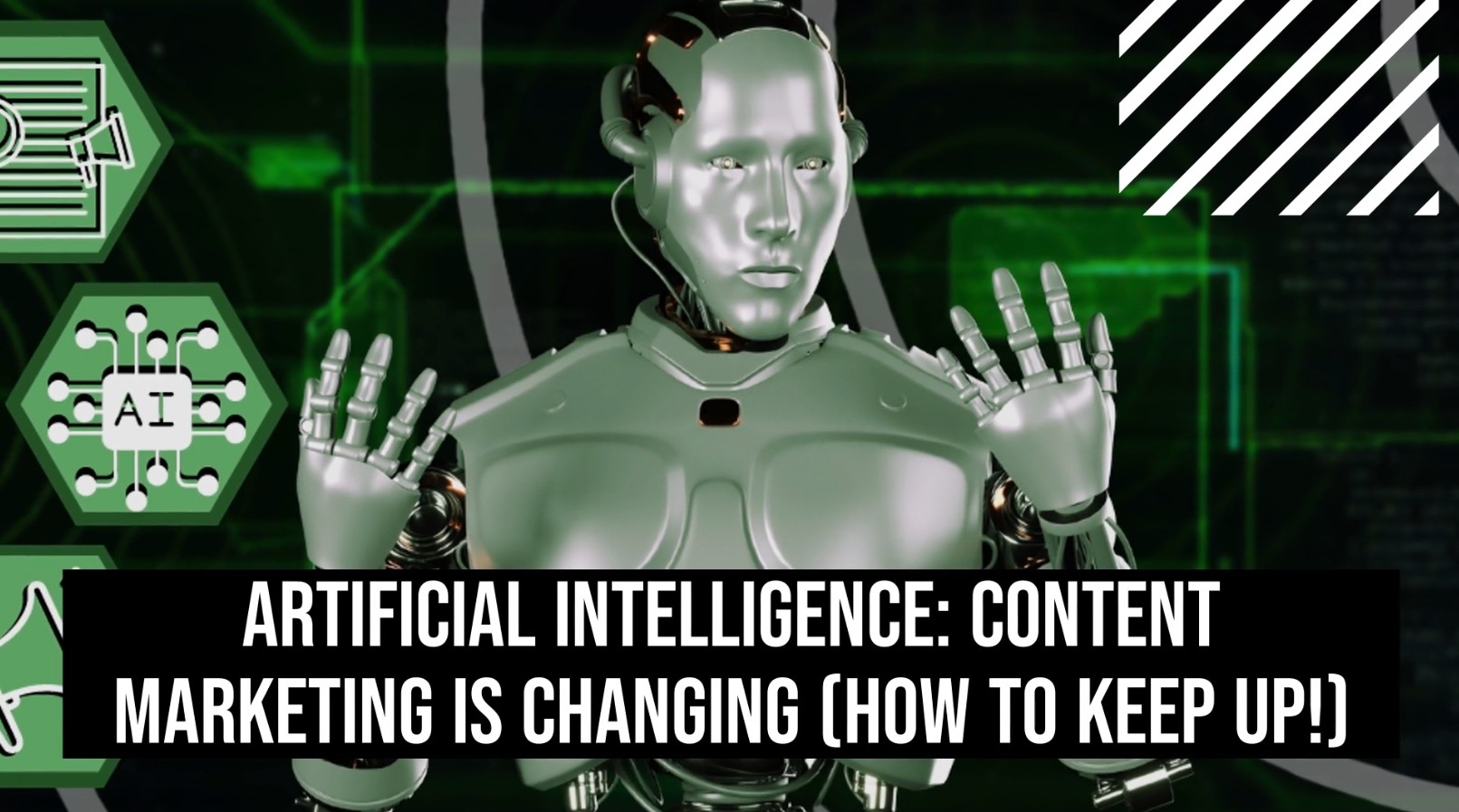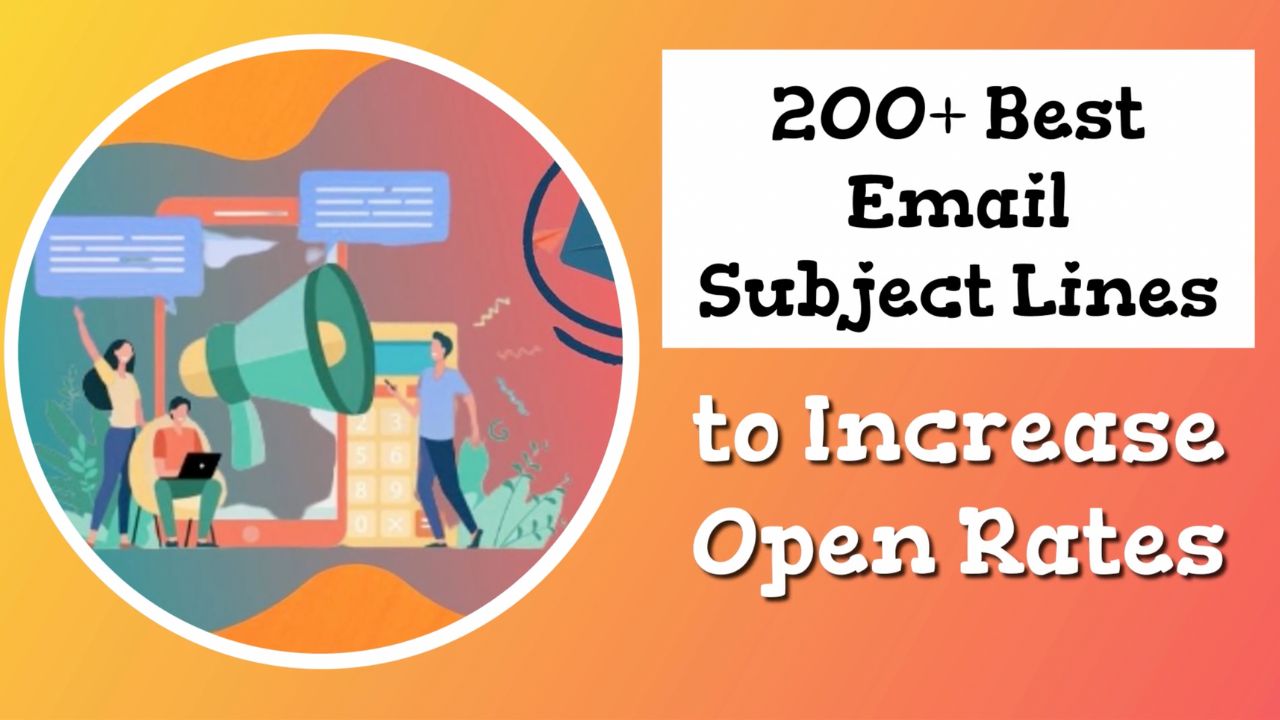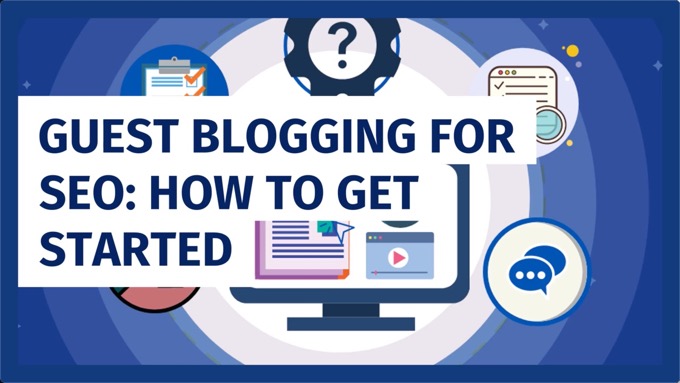Artificial intelligence (AI) is changing content marketing faster than ever.
For example...
- 44.4% of marketers now use AI to help with content creation.
But it’s not all about creating content. AI helps content marketing in other areas too.
In this post, we look at all the ways AI is impacting content marketing and delivering significant benefits, including for:
- Increasing your visibility on search
- Attracting more engagement with your content
- Providing real-time personalized content.
Let’s start digging into exactly…
How AI is Changing Content Marketing
The most obvious aspect of how AI has changed content marketing is in content creation.
Even just using the free version of ChatGPT, you can plug in a topic and get back a high-quality blog post outline or engaging social media post in seconds.
Sure, you won’t want to copy and paste as-is, but it provides a valuable starting point (and puts some hours back in the day!)
Other AI content generator tools have also sprung up, with some of them focused on a specific niche of content marketing, such as blogging or content for ecommerce websites.
But however powerful such tools might be, it’s not solely about generating new content.
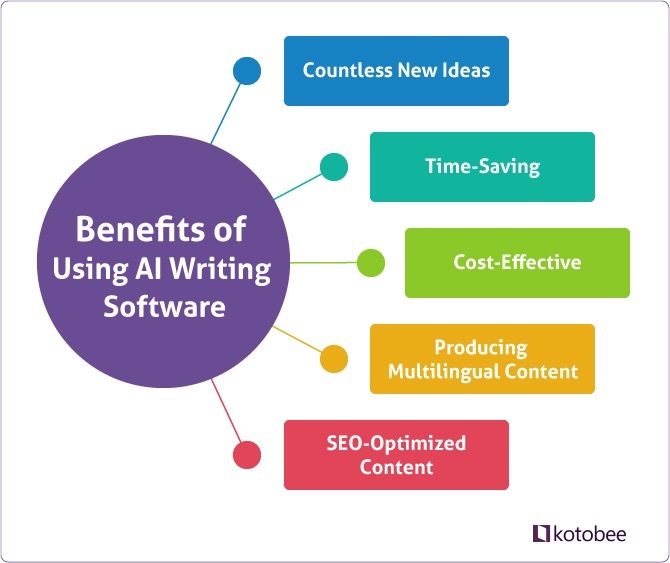
As we’ll find out shortly when we dig deeper, AI also helps with:
- Ideation—in other words, coming up with ideas designed to engage and interest your audience…
- SEO—helping content achieve more visibility on search engines (thereby delivering more traffic, conversions and general awareness for your brand)…
- Engagement—such as by dynamically personalizing content for individual visitors and subscribers (helping your content resonate more deeply, driving deeper relationships and higher conversions)…
- Reach—reaching new audiences, such as by translating existing content into new languages.
And it works!
- 91% of small businesses using AI have reported their business has become more successful as a result.
In fact, research from Ascend2 shows that businesses are using it across a wide range of marketing activities, including content marketing:
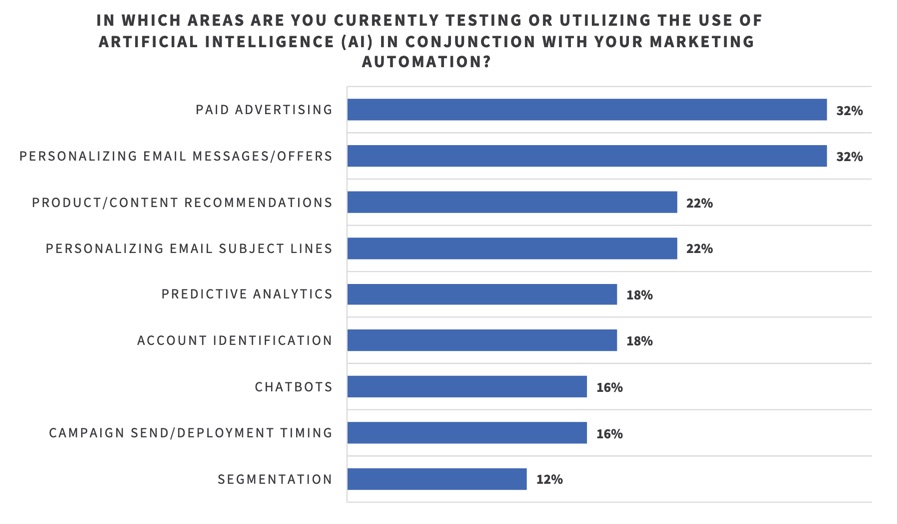
So how exactly does it help?
Let’s find out…
5 Key Benefits of Using Artificial Intelligence in Content Marketing
1. Ideation Assistance
According to a definition provided, appropriately enough, by ChatGTP, ideation is “the creative process of generating, developing, and refining ideas”.
In terms of content marketing, it’s about generating, developing and refining ideas for content that will attract your target audience.
If you’ve had experience of creating a content calendar, you’ll know that coming up with a sufficient volume of ideas can be both challenging, and often very time consuming.
AI can help in different ways, such as by:
- Saving you a ton of time—and avoiding brain ache!
- Generating potentially dozens of ideas (such as keywords to focus on) in just seconds that you can then research further and refine…
- Generating multiple content title ideas for a particular topic or keyword you can pick from…
- Suggesting niche interest areas your audience might be interested in that you may not have previously considered…
- Helping to create more relevant content via AI-driven keyword analysis.
The tools to use for doing this might include ChatGPT, Google Bard and AI-powered keyword suggestion tools.
For example, once you’ve used a keyword suggestion tool to compile a list of keywords to focus content on, you can then ask ChatGPT to generate some title ideas for you using a prompt as simple as this:
I have a blog that publishes content about [describe the topics you cover] for an audience of [describe your ideal audience]. For a post that focuses on the keyword ‘[keyword]’, generate five engaging titles that incorporate the keyword, read naturally, and are likely to attract the interest of my audience.
Cycle through other keywords with a follow-on prompt such as:
Now please generate five more titles for the keyword: ‘[keyword]’
After doing that a couple of times, you can likely just paste in the keyword and get ideas back.
But it’s not just about generating a high volume of ideas.
With access to the right data, AI can also help ensure those ideas are as relevant and impactful as possible for your audience.
For example, it can access a wealth of data on current and emerging trends so that the ideas generated are timely and even predictive, helping to engage your audience (more on engagement below!) while growing authority and credibility.
Other ways it can help include:
- Analyzing audience insight data and the content strategies of your competitors to potentially identify content gaps that may otherwise be overlooked…
- Evaluating past content performance to ideate more towards formats and topics that have previously resonated well with your audience.
2. Easier, Quicker Content Creation
Artificial intelligence introduces a number of (often significant) efficiencies into the content creation process.
For one, it helps avoid the dreaded blank page paralysis by providing a solid starting point for your content.
However, AI is not just an autopilot, plug-in-and-play solution.
It should instead be regarded as a starting point, a springboard for content creation.
In other words, AI-generated content is your first draft, not the final ready-to-go version.
So you’ll want to review it carefully and edit as required in order to:
- Check for accuracy—be aware the AI can sometimes make things up!
- Maintain a consistent tone with your other content—adapt as required to suit the usual voice and style of your content…
- Add visuals where applicable to increase engagement…
- Link to existing content and third-party sources as necessary to add value and help SEO.
Here are a couple other ways in which your content creation process can benefit from AI…
Visual Content Creation
AI of course is not just about text generation. Visual content can be generated too, including:
- Relevant images—AI-powered tools include Canva, Adobe Photoshop, DeepArt and DALL-E 2 (by OpenAI)
- Infographics—tools include Typeset, Piktochart and Appy Pie
- Video content—try tools like Runway, Wave.video, Pictory.ai and Lumen5
Scaling Content Output
With the ability of AI to cut a lot of time out of the content creation process, it becomes easier and more manageable to scale up the volume of content you produce.
That might include:
- Increasing the number of long-form content pieces you produce (such as blog posts and longer videos)...
- Increasing the volume of social media posts (including by repurposing existing content)...
- Repurposing written content for other channels—here are article rewriter tools, powered by AI, that can help you do just that:
(For more information on each tool, click here).
3. Greater Reach
Artificial intelligence is revolutionizing the number of people you can reach with your content, such as through:
- Enhanced SEO
- Optimizing your content in other ways to reach new audiences.
Let’s start with looking at its impact on SEO…
Enhanced SEO and Keyword Analysis
- 88% of SEO experts recognized the impact AI was having on SEO, such as in providing valuable insights into relevant keywords and helping to enhance search engine rankings.
For one, AI can provide insights that are not just based on basic keyword analysis but that can also understand user intent.
In fact, AI-powered SEO-focused tools can unlock game-changing insights at speeds and scales that were unimaginable just a few years ago.
For example, by harnessing AI, we can increase the chances of focusing on keywords that truly resonate with their target audience (rather than those where we’ve assumed intent, but where those assumptions are misplaced).
The end result?
It means:
- Visitors stick around for longer…
- Our web pages gain increased rankings for more keywords that matter…
- Our overall search engine visibility grows (more traffic!)
SEO is also strengthened when we use AI to help create long-form content that’s more comprehensive and provides higher value than might otherwise be accomplished.
That can include using AI to:
- Deliver advice, approaches and arguments on a particular topic that we may otherwise not even think about, or only uncover after hours of research…
- Minimize typos and grammatical errors in content (such as through tools like Grammarly, and built-in AI capabilities in software like Google Docs and MS Word).
Optimizing Content Beyond Traditional SEO
Have you thought about the potential of using AI to translate your existing content into multiple languages?
Doing so would potentially put your brand in front of huge new audiences that you’ve possibly never previously considered.
AI-driven translation tools expand reach by converting content into multiple languages, tapping into new global audiencesClick To Post OnOr optimizing your brand’s presence on social media by simply publishing at greater volumes and with more variety, facilitated by AI, ensuring you appear more consistently and in a more engaging way.
And what about AI-driven, real-time content optimization that leads to notable increases in user engagement and conversion rates, marking a major shift in how we approach content strategy?
Voice Search Optimization
What exactly is voice search optimization?
It involves tailoring content to help ensure it appears in voice searches?
But how?
Adopting a friendly, conversational tone—more in line with how people naturally speak—is key to making content more relevant for voice search queries, which AI can help to achieve.
And if you think voice search is largely irrelevant, take a look at the following graph to provide an indication of the proportion of searchers now using voice search:

4. Higher Engagement
There’s little point creating content if you’re not attracting engagement, right?
If this is an area of concern at present, artificial intelligence can prove pivotal for driving up engagement rates on different platforms, but particularly on social media.
The result is content that’s not just seen but also interacted with, leading to increased platform visibility, deeper relationships with your audience, and enhanced loyalty to your brand.
Personalized content powered by AI increases engagement, delivering tailored experiences that resonate with individual audience membersClick To Post OnSo how?
Creating More Engaging Content
AI-powered tools (such as those now built into many social media platforms) are now able to analyze large amounts of data to indicate exactly what types of content are attracting the most interest and interaction from your audience.
And they can even do this for specific audience segments, showing the demographics of those who resonate most with particular content.
Studying such analytics can direct future content, driving up engagement over time.
But it’s not just the analytics.
Content creation tools that utilize AI can create engaging visuals in seconds that more effectively capture audience attention.
And AI-powered content creation platforms (like HubSpot, Marketo and Persado) can produce dynamic content tailored directly to individual users, significantly boosting engagement rates.
Optimized Timing for Content Delivery
What if you were posting content on social media at the exact times your audience was most active and engaged?
Doing so can significantly increase the visibility of your posts, growing your engagement levels.
This is not about generalized advice on when to post, but posting at optimal times based on the behavior of your own audience.
The same applies for the delivery of email messages, with 39% of marketers using AI to optimize send times.
Interactive, Dynamic Content
This includes content such as the following, which are inherently more engaging than static content:
- Quizzes
- Polls
- Interactive videos
AI can help:
- Identify the types of interactive content that are most likely to resonate with your audience…
- Create such content…
- Make content more dynamic and engaging, such as by adjusting subsequent questions in a quiz or poll based on a user’s earlier responses, boosting its relevance and increasing engagement and conversions.
5. Personalization
Personalization also drives up engagement of course, but such is its significance, and the crucial role that AI plays, it’s worthy of its own section.
It’s probably something you’re already taking advantage of, perhaps within your CRM or autoresponder service used to mail your list.
AI can do so at scale, such as via software like PathFactory that automates the delivery of personalized content experiences.
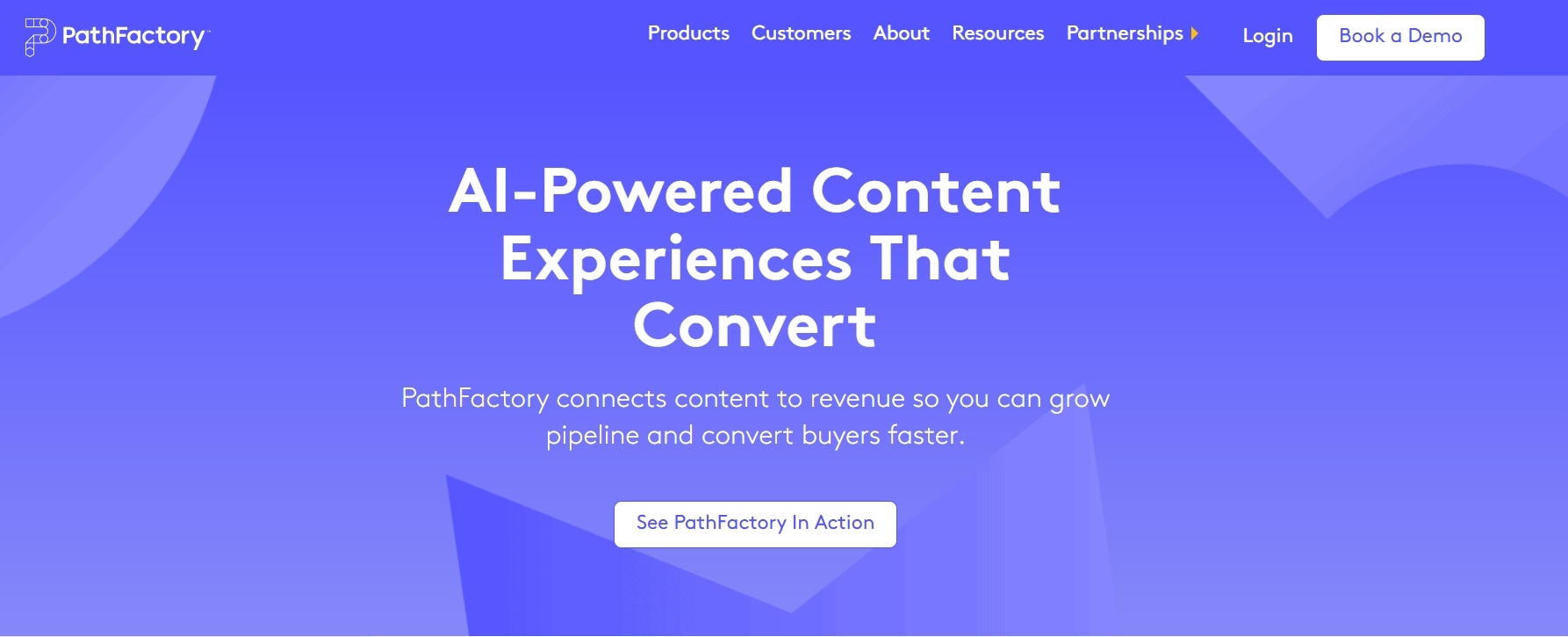
AI-powered personalization provides businesses with increased content engagement rates, improves the user experience, and drives up conversation rates.
This would be impossible without the use of AI, which can sift through large amounts of data, identify patterns and make predictions about content that’s most likely to hold a particular individual’s attention, based on their past history as well as third-party data where available.
The proof of the effectiveness of AI for delivering personalized content experiences can be seen across all the main social media platforms, which provide personalized feeds for users in order to hold their attention for as long as possible.
Even Google Ads via its Smart Display Campaigns uses AI to determine the most effective ad to show to individual web users, mixing together various content components you supply (such as titles, visuals and descriptions).
Similar AI-powered personalization technologies are now available for your brand’s website too.
For example, if you run an ecommerce site, you can show products based on what the visitor is most likely to be interested in.
The impact on profitability from using AI-powered personalization can be profound.
Examples of Using AI Tools for Content Marketing
Small businesses are reaping the rewards of what AI can deliver via dedicated software such as:
- Grammarly for polishing content to a high standard, ensuring it is free of grammatical errors and stylistically consistent.
- HubSpot for AI-powered SEO recommendations and optimal topic recommendations, enhancing content visibility and engagement.
- BuzzSumo to provide deep content insights based on ‘big data’ analysis, helping identify trending topics and influential content creators.
- SEMrush for comprehensive SEO toolkit functionality, including keyword research, site audits, and competitor analysis, all enhanced by AI to improve search engine rankings and online visibility.
- MarketMuse, which uses AI to analyze content and compare it against the existing content on the web, offering recommendations for improvement and new content opportunities to ensure comprehensive coverage and authority on specific topics.
In fact, dozens (if not hundreds) of AI-powered tools are now available that help with content marketing, such as these content generator tools or these article rewriter tools.
But let’s take a quick look at a couple of the tools listed above to get a feel for the impact that the use of artificial intelligence can have.
Grammarly
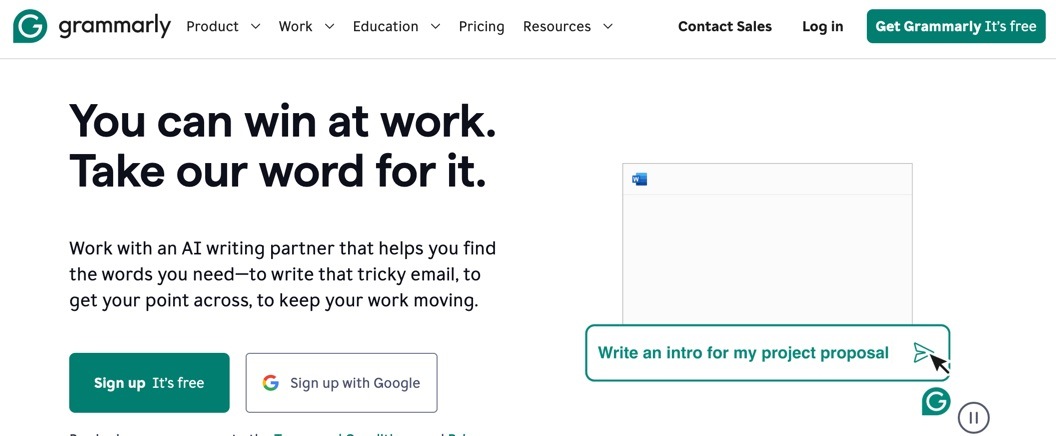
An article from Business Wire has highlighted the impact Grammarly has had on businesses, including:
- Savings of 19 working days or ~$5,000 per employee annually
- Positive results experienced at Atlassian, Zoom, Databricks, Expedia, Expensify, and Siemens—in fact, 96% of Fortune 500 are reported to be users of Grammarly
- ModMed saved over 12 hours per employee per month
- Databricks improved their brand compliance by 71% and cut editing time by 50%.
BuzzSumo
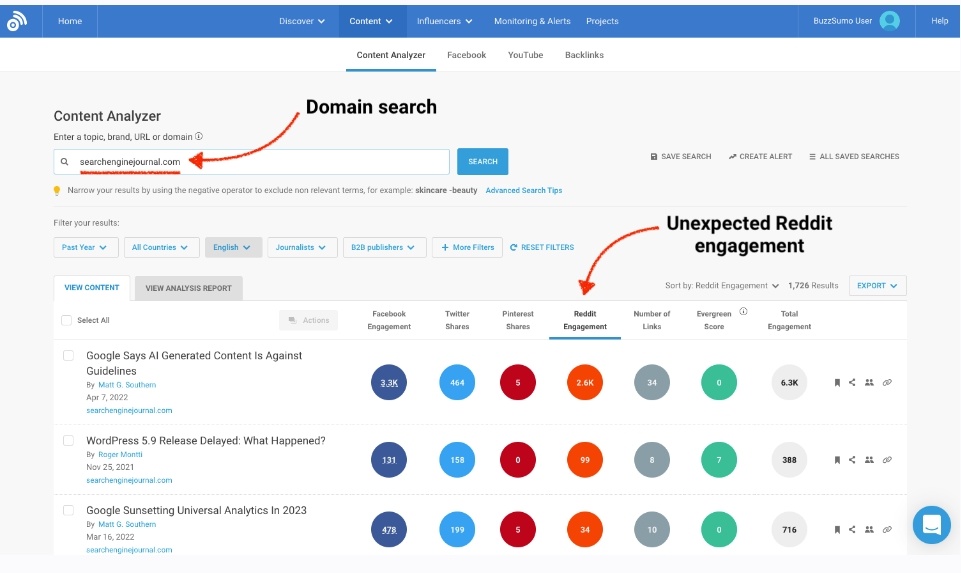
BuzzSumo's success stories include numerous examples of how different businesses have used the tool to achieve significant improvements in their content marketing efforts, including:
- Pepperdata increased their webinar registrations 5x using BuzzSumo
- Erika Heald Marketing tripled clients' social media traffic
- Rise at Seven secured a $400K pitch with the help of BuzzSumo
- theCLIKK boosted open rates by 10%, and enhanced their content curation activities.
How to Keep Up With the Use of AI in Content Marketing
As we’ve seen, content marketing is rapidly evolving, and staying ahead means keeping up with the latest AI advancements.
But how?
Here’s a streamlined approach to ensure you don’t get left behind:
- Recognize current trends—begin by identifying the latest AI innovations shaping content marketing. Whether it's the widespread adoption of chatbots or the strategic application of predictive analytics, understanding these trends is crucial for informing your strategy and ensuring relevance.
- Set clear goals—start by defining what challenges AI will help you tackle. This will help you prompt more effectively, whether that’s for improving content, personalization, or data analysis. Note that having clear goals will guide your AI choices.
- Develop a strategic plan—make a roadmap for smoothly adding AI to your existing content marketing. This might mean changing how things work, giving your team AI training, or teaming up with AI experts.
- Monitor and adapt—leverage artificial intelligence content marketing for more than just automation. Use it to gain insights into audience engagement and behavior.
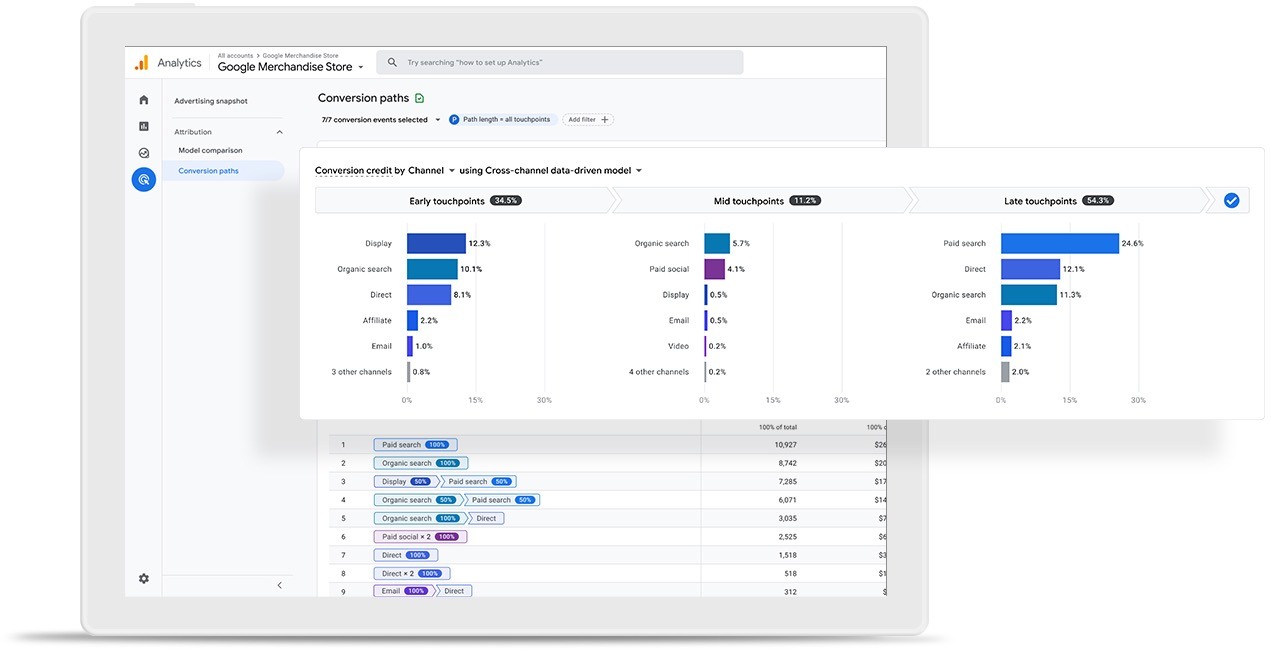
Tools like Google Analytics can track website metrics, while Hootsuite Insights helps with social media engagement.
Regularly review your strategy's performance using these tools and adapt as AI technology and market trends evolve.
-
Keep the human touch—while artificial intelligence is great for efficiency, remember that the human touch still matters in content marketing. Aim for a balance between AI efficiency and human connection to connect with your audience.
-
Stay in the loop—AI tech changes fast. Keep an eye on the latest AI news and updates. Newer tools might be just what you need as your content marketing evolves.
Frequently Asked Questions
How can AI help with content creation in content marketing?
AI tools streamline content creation, producing high-quality drafts in seconds, allowing marketers to focus on strategy and refinement.
What benefits does AI offer in content marketing?
AI-driven translation tools expand reach by converting content into multiple languages, tapping into new global audiences.
How does AI increase engagement in content marketing?
Personalized content powered by AI increases engagement, delivering tailored experiences that resonate with individual audience members.
How can AI enhance SEO in content marketing?
AI provides insights into user intent, optimizes content for search engines, and enhances visibility, leading to increased rankings and traffic.
How can marketers keep up with AI advancements in content marketing?
Recognize current trends, set clear goals, develop a strategic plan, monitor and adapt, keep the human touch, and stay informed on AI tech updates.
To Conclude
As we’ve seen, artificial intelligence is having a huge impact on content marketing, such as for enhancing efficiency, personalization and engagement.
The best approach is to see AI as a partner for your content marketing activities.
Don’t expect it to do everything via an autopilot set-and-ignore approach, but instead see it as a highly efficient member of your team that can be counted on to contribute in a significant way… and, let’s be honest, take care of activities (such as real-time personalization) that no human could ever meaningfully do.
And don’t forget to keep up with the latest technologies. AI and the tools that use it to help with content marketing are changing all the time, skyrocketing efficiencies and enabling all of us to create better content, create more of it, and be visible in more places more easily.
